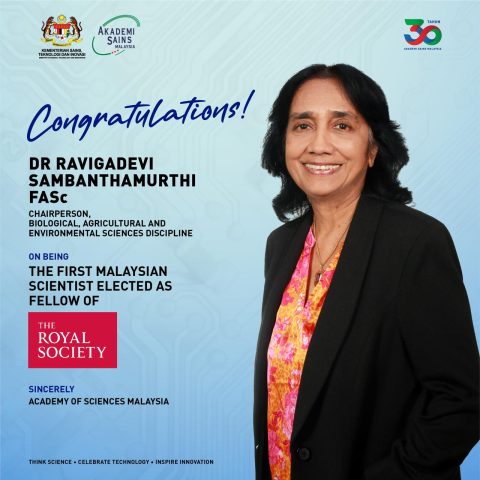
Insights from ASM President at the 30th AGM
June 18, 2025
Call for Nominations: 2025 APEC ASPIRE Prize
June 18, 2025Malaysia has achieved a historic milestone with the election of Dr Ravigadevi Sambanthamurthi FASc as a Fellow of the Royal Society, the world’s oldest and most prestigious scientific academy. She is the first Malaysian to be elected since its founding in 1660.
Dr Ravigadevi, a pioneering biotechnologist and ASM Fellow, will be formally inducted in London on 11 July 2025, where she will sign the Society’s historic Charter Book alongside the signatures of scientific luminaries spanning three centuries.
As former Director of the Advanced Biotechnology and Breeding Centre at the Malaysian Palm Oil Board (MPOB), she led transformative research in oil palm genomics and sustainability. Her team’s decoding of the oil palm genome, published in Nature, led to the discovery of the SHELL gene, enabling DNA-based selection of high-yield trees and reducing environmental impact. She also developed methods to recover valuable compounds from palm oil mill effluent, turning waste into a resource.
Her global recognition includes the Knight of the International Order of Merit of Inventors (2009), the Intel Environment Laureate Award (USA), and the Tan Sri Augustine Ong Lifetime Achievement Award (2022).
“This is a profoundly humbling honour,” Dr Ravigadevi said. “I see this not as a personal achievement, but as a tribute to the exceptional teams I’ve had the privilege to work with.”
Minister of Science, Technology and Innovation, YB Chang Lih Kang, called the achievement “a proud moment for our nation,” while ASM President Datuk Dr Tengku Mohd Azzman Shariffadeen FASc noted that it highlights Malaysia’s growing impact in global science.
Founded in 1660, the Royal Society counts Isaac Newton, Charles Darwin, Albert Einstein, and Stephen Hawking among its Fellows. Dr Ravigadevi’s election also carries special significance for women in science, as the Society only began admitting women in 1945.
Her achievement stands as both a national triumph and an inspiration for future generations of scientists, particularly women and those from developing nations.

